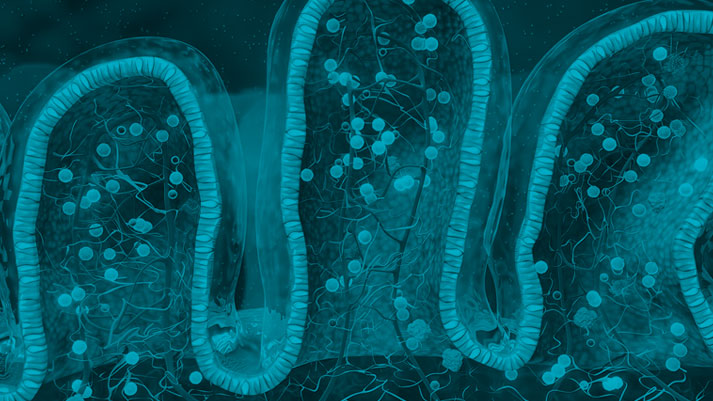3 Common Probiotics Myths
The Truth About Probiotics, Postbiotics and Their Health Benefits

By now you’ve probably heard that probiotics are good for your gut health. But do you know what qualifies as a probiotic? Or that different probiotic strains impact your health in particular ways?
Increased interest in gut health has propelled growth in the probiotic market in recent years, leaving the majority of consumers confused and leading the International Scientific Association for Probiotics and Prebiotics (ISAPP) to define probiotics as “live microorganisms that, when administered in adequate amounts, confer a health benefit on the host.”
Expanding upon ISAPP’s definition, we address three of the most common myths and misconceptions around probiotics and their effects below.
Myth #1: All Fermented Foods are Rich in Probiotics
Most consumers believe they are getting a steady supply of probiotics by consuming fermented foods and beverages, such as yogurt, Kiefer, kombucha and sauerkraut. Which may or may not be true, depending on the label and time of consumption.
According to the ISAPP, fermented foods are generally not sources of probiotics because very few contain microbes that fit the criteria to be called probiotic. In order to be considered probiotic, a defined microbial strain must be researched and proven to provide a health benefit in at least one randomized controlled trial. Which leads us to another common myth – not all microbes or bacterial strains are probiotic.
Additionally, many fermented foods no longer contain living microbes by the time of consumption. If a fermented product is baked, roasted and/or pasteurized, the process kills the living bacteria. That said, some manufacturers will add live postbiotic strains after a fermented product has been heat-treated or filtered. Look for products with specific, clinically-tested microbial strains and number of colony-forming units (CFUs) identified on its label. However, probiotics will continue to die off so it’s nearly impossible to know the exact number of CFUs at time of consumption.
Myth #2: Microbes Must Be Living to Be Good for You
While probiotics are living microbes that must be consumed live to impact an aspect of your health, the latest category of biotics – postbiotics – don’t. Postbiotics are defined by the ISAPP as “a preparation of inanimate microorganisms and/or their components that confers a health benefit on the host,” meaning they are no longer viable yet still provide a health benefit.
In order for probiotics to be beneficial, the live bacteria must interact with other material (mainly prebiotic fibers) within your digestive tract. When probiotic bacteria consumes prebiotic fibers they produce a beneficial compound or molecule. Hence, they must be living to do so. Postbiotics, on the other hand, already contain a beneficial compound or structure within them; and, therefore, don’t need to be alive (and ferment fiber) to impact your health.
Postbiotics are derived from live bacteria that undergoes a deliberate processes to terminate cell viability, while retaining its beneficial molecule. It’s important to note, however, that postbiotics don’t need to be derived from probiotics — and not all probiotics can simply be heat-treated, or otherwise killed, to become postbiotics. And, just like probiotics, postbiotics must be researched and proven to provide a specific health benefit to qualify as such.
Myth #3: All Probiotics are Equal and Do the Same Thing
When it comes to probiotics and postbiotics, the specific strain matters. Each microbial strain has different properties, thus providing various health benefits. The specific health benefit is particular to the strain of bacteria.
Certain bacterial strains, whether a probiotic or postbiotic, help relieve digestive symptoms, such as diarrhea, bloating and constipation, while others help reduce certain types of infections, including urinary tract and respiratory infections. Perhaps one of the most overlooked health benefits of probiotics and postbiotics are the level of immune support particular microbial strains provide.
Remember that in order to qualify as either a probiotic or postbiotic it must provide a specific, proven health benefit. Look for products containing an identifiable microbial strain, or strains, backed by scientific and clinical research supporting the health benefits you after.
Interested in a science-back postbiotic for immune support?
IMMUSETM (LC-Plasma) is a science-backed postbiotic shown to provide more comprehensive immune support at the cellular level. Backed by 30 published studies, the immune health ingredient has been the subject of 15 human clinical trials, including 13 efficacy and 2 safety studies, and has received self-affirmed GRAS (generally recognized as safe).
IMMUSE is a unique strain of lactic acid bacteria, Lactococcus lactis strain Plasma (LC-Plasma), made by an innovative fermentation process that was then heat-treated, turning the beneficial strain into a postbiotic. As a postbiotic, IMMUSE is not only more stable, but can easily be formulated into functional foods and beverages thanks to no viability issues.
